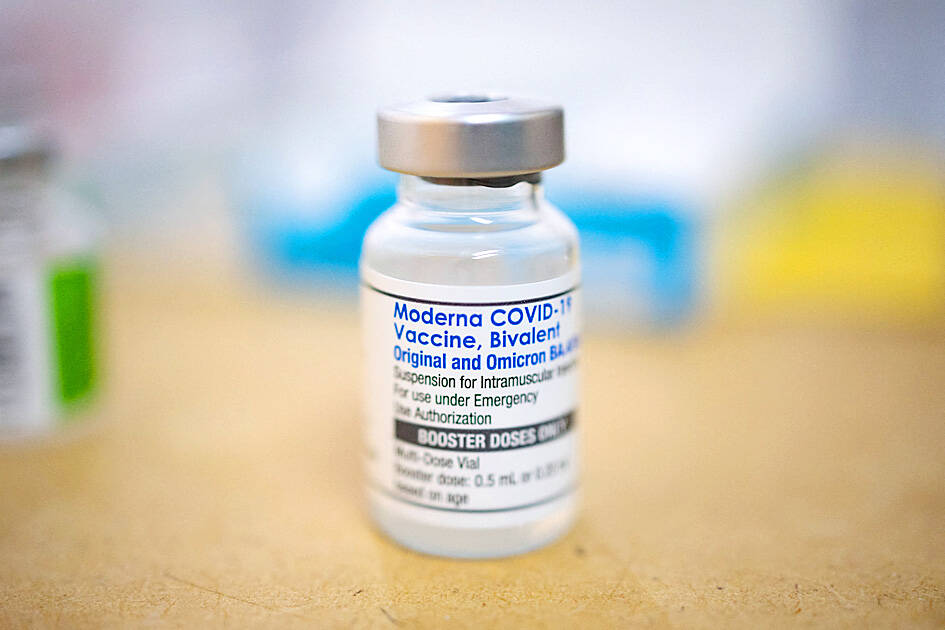Moderna Inc has refused to hand over to China the core intellectual property behind the development of its COVID-19 vaccine, leading to a collapse in negotiations on its sale in the country, the Financial Times reported on Saturday, citing people familiar with the matter.
The Cambridge, Massachusetts-based pharmaceutical company turned down China’s request to disclose the formula for its mRNA vaccine because of commercial and safety concerns, the newspaper said, citing people involved in negotiations that took place from 2020 to last year, adding that the vaccine maker is still “eager” to sell the product to China.
The company had “given up” on its previous efforts to access the Chinese market because of Beijing’s demand that it reveal the technology as a prerequisite for its sale in the country, the report said.

Photo: Reuters
China has not approved any foreign COVID-19 vaccines and relies on several domestically developed shots.
Moderna chief medical officer Paul Burton last month said the company is keen to collaborate with China on supplying its mRNA-based COVID-19 vaccines to the country.
“We would certainly be very eager to collaborate with China if they felt that there was a need for a vaccine there,” Burton told a news conference. “Currently, there is no activity going on, but we’d be very open to it.”
Moderna established a subsidiary in Taiwan on Thursday last week, as the company makes efforts to collaborate with the nation’s private and public sectors, as well as academia, the subsidiary’s general manager Joyce Lee (李宜真) said.
Meanwhile, Taiwan has since early last month received four shipments of the US company’s next-generation COVID-19 vaccine targeting the BA.4 and BA.5 Omicron subvariants of SARS-CoV-2, and local cities and counties began administering the doses on Sept. 24, the Central Epidemic Command Center said.
Additional reporting by staff writer

South Korea’s equity benchmark yesterday crossed a new milestone just a month after surpassing the once-unthinkable 5,000 mark as surging global memory demand powers the country’s biggest chipmakers. The KOSPI advanced as much as 2.6 percent to a record 6,123, with Samsung Electronics Co and SK Hynix Inc each gaining more than 2 percent. With the benchmark now up 45 percent this year, South Korea’s stock market capitalization has also moved past France’s, following last month’s overtaking of Germany’s. Long overlooked by foreign funds, despite being undervalued, South Korean stocks have now emerged as clear winners in the global market. The so-called “artificial intelligence

‘SEISMIC SHIFT’: The researcher forecast there would be about 1.1 billion mobile shipments this year, down from 1.26 billion the prior year and erasing years of gains The global smartphone market is expected to contract 12.9 percent this year due to the unprecedented memorychip shortage, marking “a crisis like no other,” researcher International Data Corp (IDC) said. The new forecast, a dramatic revision down from earlier estimates, gives the latest accounting of the ongoing memory crunch that is affecting every corner of the electronics industry. The demand for advanced memory to power artificial intelligence (AI) tasks has drained global supply until well into next year and jeopardizes the business model of many smartphone makers. IDC forecast about 1.1 billion mobile shipments this year, down from 1.26 billion the prior

NEW IDENTITY: Known for its software, India has expanded into hardware, with its semiconductor industry growing from US$38bn in 2023 to US$45bn to US$50bn India on Saturday inaugurated its first semiconductor assembly and test facility, a milestone in the government’s push to reduce dependence on foreign chipmakers and stake a claim in a sector dominated by China. Indian Prime Minister Narendra Modi opened US firm Micron Technology Inc’s semiconductor assembly, test and packaging unit in his home state of Gujarat, hailing the “dawn of a new era” for India’s technology ambitions. “When young Indians look back in the future, they will see this decade as the turning point in our tech future,” Modi told the event, which was broadcast on his YouTube channel. The plant would convert

People stand in a Pokemon store in Tokyo on Thursday. One of the world highest-grossing franchises is celebrated its 30th anniversary yesterday.